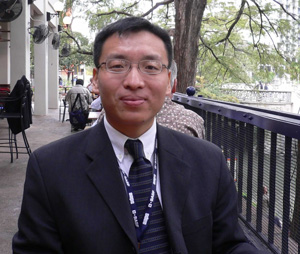Based at Tsinghua University in China, Yanbin Huang’s group works at the interface between polymer science and pharmaceutical science, specifically on synthetic polymers as the active pharmaceutical ingredients (API), drug-polymer conjugates, and drug/polymer solid dispersions.
Why not read Yanbin Huang’s latest ChemComm publication on ‘Toward the synthesis of sequence-controlled vinyl copolymers’? It will be free to access until the 5th of January, 2011.
Yanbin took some time out from his research to answer a few questions for us…
What initially inspired you to become a scientist?
I wanted to become a professor since I learned there was such a profession, probably attracted by its freedom and intellectual excitement, but also because five other family members had been teachers. Later on in college, I found out that research was part of being a professor, and found that I enjoyed discovering and creating new things as well as teaching what i’d learned.
What was your motivation behind the work described in your ChemComm article?
Our paper is about a strategy to synthesise vinyl copolymers with monomer-level sequence control. I was trained as a polymer scientist at Tsinghua University and always found it tempting to unify the synthetic and biological macromolecules into one coherent polymer science, with the only difference between them being to what extent we can control the sequence of the chain structure. I started dreaming about sequence-controlled vinyl copolymers in 2000 when I was still a PhD student in Professor Peppas’ group at Purdue, and in the summer of 2009 I finally figured out the working strategy to do this.
Why did you choose ChemComm to publish your work?
For its large and diverse readership and great reputation in chemical science.
Where do you see your research heading next?
The detailed chemistry still needs improvement. For example, the yield of each synthesis cycle should be higher than 95% to make it practical for a long polymer chain. I hope our results so far have shown that this mono-addition followed by transformation strategy works and more groups will start working on these problems (there are already several great groups, including Professors Sawamoto and Kamigaito in Japan, and Professor Lutz in Europe, who are working on sequence-control vinyl copolymer synthesis). Afterwards, we can study the vinyl copolymers similar to proteins, i.e., to design its sequence, synthesise it, and then investigate its physics and biological activities.
What do enjoy doing in your spare time?
Reading books, watching movies, taking long walks and having dinner with my family and friends.
If you could not be a scientist, but could be anything else, what would you be?
I actually had serious plans to become a movie director like Ingmar Bergman and Hsiao-Hsien Hou.
So, ‘that’s a wrap’ from Yanbin Huang, but if you fancy reading more about his research and the communication he discusses (recently published in ChemComm), then download the article today, which is free to access until the New Year (5th January)!












